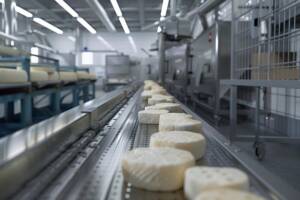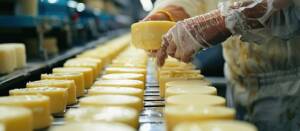
The probiotic food industry has witnessed remarkable growth in recent years, due to the many health benefits provided by these microorganisms. Probiotic cheese is one of the food products that combine delicious taste with health benefits, as it contributes to enhancing digestive health and strengthening immunity.
In this article, we will discuss the details of the probiotic cheese industry, starting from the production stages to the challenges and opportunities facing this field, to explain how this type of cheese can be a valuable addition to a healthy diet.
What is probiotic cheese?
Probiotic cheese is a food product that combines the traditional nutritional value of cheese with the health benefits provided by probiotics. Probiotics are live microorganisms that contribute to improving digestive health and enhancing immunity. They are added to cheese to provide a healthy food option that enhances the balance of good bacteria in the intestines.
The importance of probiotics in foods
Probiotics are witnessing increasing interest in the food industry due to their proven health benefits. These beneficial bacteria contribute to improving the digestive process, strengthening the immune system, and reducing digestive disorders such as constipation and irritable bowel syndrome.
Benefits of Probiotic Cheese
Promoting Digestive Health
Probiotic cheese contains ingredients that stimulate the growth of beneficial bacteria in the intestines. These bacteria help improve the balance of the gut microbiome, which contributes to improving digestion and absorption of nutrients.
Boosting the immune system
Some types of probiotics contribute to enhancing the body’s immune response, which reduces the risk of infection and disease. Adding probiotics to cheese makes it a beneficial nutritional choice to enhance overall health.
Improving Nutrient Absorption
Foods fortified with probiotics, such as probiotic cheese, help improve the absorption of vitamins and minerals such as calcium, which contributes to enhancing bone health and preventing osteoporosis.
Stages of Probiotic Cheese industry
1-Choosing Milk
The first step in probiotic cheese industry is choosing the right milk. Cow’s, sheep’s, or goat’s milk can be used in this process. It is important that the milk is fresh and free of contaminants to ensure the quality of the final product.
2-Adding Probiotics
Adding probiotics is the essential step in making this type of cheese. A mixture of beneficial bacteria is added to the milk at a certain stage of production, and these bacteria are left to multiply during the fermentation process.
3-Fermentation
During the fermentation stage, probiotic bacteria convert lactose (milk sugar) into lactic acid, which contributes to the freezing of the milk and turning it into cheese. This process also contributes to enhancing the flavor of the cheese and developing its texture.
4-Filtering and preparing the cheese
After the fermentation stage is complete, the frozen milk is filtered to get rid of the excess liquid (curd). The cheese is then formed in suitable molds and left to ferment and reach the desired consistency.
5-Storage and aging
The aging period of probiotic cheese varies according to the type of cheese to be produced. During this stage, the beneficial bacteria continue to work to improve the flavor and texture. This period also contributes to increasing the concentration of probiotics in the cheese.
Challenges in Probiotic Cheese industry
Maintaining the Vital Activity of Probiotics
One of the main challenges in the probiotic cheese industry is maintaining the vital activity of the bacteria throughout the production process. Temperatures and fermentation times must be carefully controlled to maintain live bacteria in the final product.
Compatibility between taste and health benefits
Achieving a balance between health benefits and flavor is an important challenge. In some cases, some types of probiotics may affect the flavor of the cheese, so it is essential to choose the right strains that provide the desired health benefits without negatively affecting the taste.
Stability during storage
The probiotic cheese industry faces challenges related to ensuring that the probiotic bacteria remain active and alive during the storage period and until the cheese is consumed. The packaging method and temperature control during storage are critical factors in the success of this industry.
Types of Probiotic Cheese
Soft cheese with probiotics
Soft cheeses such as cottage cheese or ricotta can contain high amounts of probiotics. These types of cheese are usually light and easy to digest, making them a preferred choice for people with digestive problems.
Probiotic aged cheese
Aged cheeses such as cheddar and gorgonzola can also contain probiotics. These cheeses undergo a longer aging period, which adds a distinct flavor and rich texture.
Lactose-free cheese with probiotics
Probiotic cheese making offers an ideal option for people with lactose intolerance. This type of cheese is produced using lactose-free milk and adding specific strains of probiotics that help digest other ingredients.
Quality standards in the production of probiotic cheese
Quality standards and production control are essential factors in ensuring the effectiveness of probiotics in the cheese produced. The success of this type of cheese depends largely on maintaining the vital activity of live bacteria throughout the production and storage period.
Selection of appropriate bacterial strains
Probiotic bacterial strains must be carefully selected to ensure the desired health effect. Probiotic strains vary in their potency and stability, making careful selection an essential part of the production process. These strains can also affect the flavour and texture of the cheese, so they must be compatible with the desired taste.
Control of environmental conditions
Temperature and humidity must be carefully controlled during the manufacturing and storage stages to ensure that the probiotics remain effective. Exposure to high temperatures or unsuitable conditions can destroy live bacteria, reducing the health benefits of the final product.
Factors that affect the flavor of probiotic cheese
The flavor of probiotic cheese varies depending on several factors, including the type of milk used, the type of bacterial strains added, and the fermentation period. Achieving a balance between flavor and health benefits is one of the main goals in making probiotic cheese.
The effect of the type of milk
The type of milk used in making probiotic cheese plays a major role in determining the flavor of the cheese. Cow’s milk, sheep’s milk, or goat’s milk can be used, and each type offers a distinct flavor and texture. Goat’s milk, for example, is an option that offers a stronger flavor and a smoother texture.
The role of the fermentation period
The fermentation period is one of the factors that greatly affects the flavor of probiotic cheese. The longer the fermentation period, the more complex and flavorful the cheese becomes. The fermentation period can range from several days to several months, depending on the type of cheese desired.
Maintaining the sustainability of probiotics in the product
To ensure the effectiveness of probiotic cheese as a source of live probiotics, certain measures must be taken to maintain the activity of the bacteria throughout the storage period and until the cheese is consumed.
Packaging techniques
Packaging techniques play a major role in preserving probiotics. Modern techniques such as packaging in modified atmospheres are used to control oxygen and humidity levels, which helps maintain the optimal environment for the continued activity of probiotics.
Storage at appropriate temperatures
Probiotic cheese should be stored at temperatures ranging from 2 to 8 degrees Celsius, which is the optimal environment to maintain the life of the bacteria without harming them. Direct exposure to light, which may negatively affect the quality of the product, should also be avoided.
Probiotic cheese industry is a promising field that combines nutrition and health benefits. With the increasing interest in functional foods, this type of cheese has become a healthy and delicious option at the same time. ProNano Food Industry Consulting Company provides advanced solutions for those wishing to enter this field or develop their products. With its experience in the food industry, it can provide the necessary advice and services to achieve success in this sector. You can contact ProNano and get specialized advice.
Read more about establishing a cheese and dairy factory



